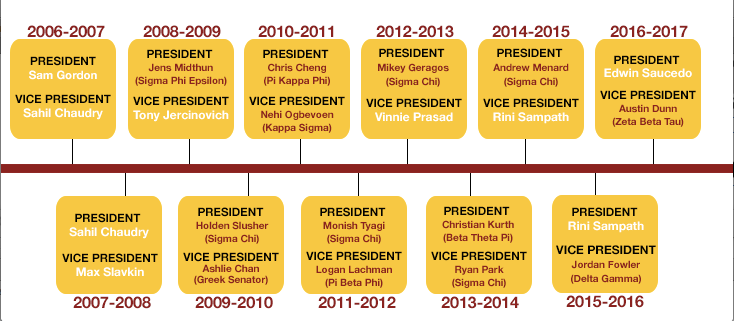Greek organizations dominate USG
When Mikey Geragos announced his candidacy for Undergraduate Student Government president in 2012, his Sigma Chi fraternity brothers knew what to do. The freshmen pledges volunteered to distribute flyers on Trousdale Parkway. Many brothers committed to supporting the campaign on social media, or showed up to cheer for Geragos at debates.
“It was like a routine,” Geragos said of the coordinated response.
Raised by a family of proud Trojans, Geragos attended his first football game at the Los Angeles Memorial Coliseum when he was just a toddler. From the moment he stepped onto campus as a USC freshman, the affable Pasadena native knew he wanted to lead the University he had grown to love. His fraternity’s strong legacy of leadership gave him the added confidence — and strategic advantage — to pursue his dream.
“I had resources immediately that I don’t know how I would’ve gotten if I wasn’t in greek life,” Geragos said.
The greek system has long exercised a significant role in student government at USC. With historically low rates of voter turnout for USG elections, sororities and fraternities represent a major voting bloc — one that candidates must capitalize on to win.
It comes as no surprise, then, that seven of the past 10 student body presidents have held fraternity affiliations. Four presidents came from Sigma Chi, an unofficial student government powerhouse.
Geragos, who won the 2012 election with 2,376 votes, cited manpower and name recognition as the primary strategic benefits of his involvement in the greek community.
“It comes down to how many people know your name,” Geragos said. “Socially, when you’re in a greek organization, on average, you’re probably interacting with more people.”
In recent years, USG has attempted to mitigate the influence of the greek community in elections by increasing overall voter turnout. Kat Lee, associate director of elections, said more students would participate if they appreciated just how much USG shapes their undergraduate experience.
“I don’t think people realize the impact that USG can have on the student body,” Lee said.
Lee referenced the extension of the drop deadline for classes and the University’s partnership with Uber, as meaningful changes negotiated by USG. By informing more students about these advocacy initiatives — through holding external office hours on Trousdale and developing an aggressive social media marketing campaign — she hopes to make policy, rather than popularity, the central focus of elections.
“I think for candidates to be successful, they really need to appeal to a huge, diverse crowd,” Lee said. “The key to winning isn’t just winning over the greek Row.”
Rini Sampath’s 2015 USG victory provides compelling support for Lee’s argument. With 3,906 votes, Sampath and her running mate Jordan Fowler became the first all-female ticket elected in USC history. Among other notable accomplishments, Sampath’s trailblazing presidency bucked a long tradition of greek dominance at the highest levels of student leadership, paving the way for current USG President Edwin Saucedo.
While Sampath did not belong to a sorority, USG Senator Paul Samaha said she leveraged her close relationships with the greek community to win the election.
“Rini showed that you don’t necessarily have to be greek to win, as long as you have ties to the system,” said Samaha, who worked as director of communications for the campaign.
Although Geragos used his fraternity ties to secure votes, once elected, he shifted his focus to advocate on behalf of the entire student body.
“I got a lot of requests from my friends in the greek community who were unhappy with what the administration was doing,” Geragos said. “I didn’t see going after that as a priority. I saw that as the Interfraternity Council’s priority.”
Presidential candidate and current USG Vice President Austin Dunn, a member of the Zeta Beta Tau fraternity, echoed this sentiment. Dunn said his greek affiliations would not hinder him from effectively representing the interests of the broader campus.
“The reality of the situation is, the constituency that we advocate the least for is the greek community. That doesn’t necessarily mean that they have everything they need, but we work on a need basis,” Dunn said. “We ask students what needs to be changed on campus. And those changes are not primarily from the greek community.”

